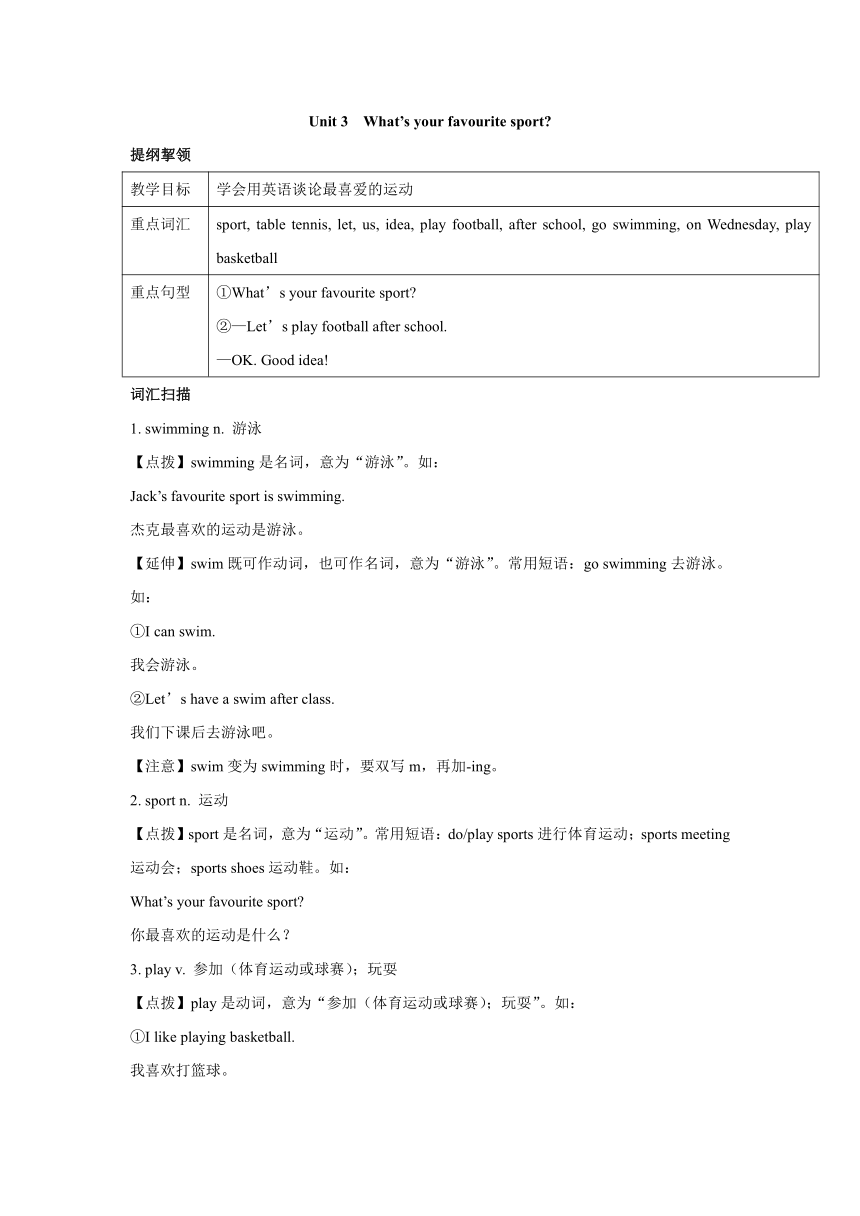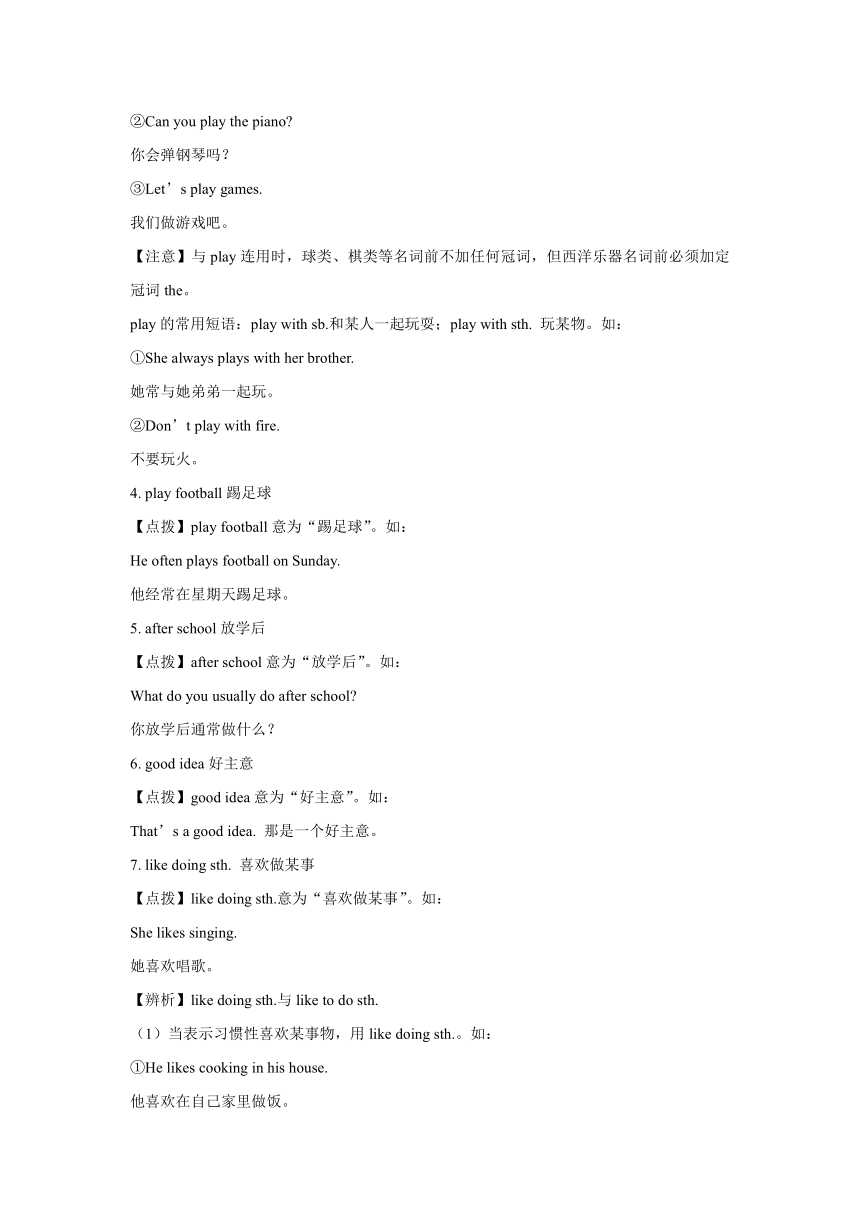外研版英语七年级上册 Starter Module 4 Unit 3 What's your favourite sport?教案
文档属性
| 名称 | 外研版英语七年级上册 Starter Module 4 Unit 3 What's your favourite sport?教案 |  | |
| 格式 | docx | ||
| 文件大小 | 13.1KB | ||
| 资源类型 | 教案 | ||
| 版本资源 | 外研版 | ||
| 科目 | 英语 | ||
| 更新时间 | 2023-06-19 10:52:37 | ||
图片预览


文档简介
Unit 3 What’s your favourite sport
提纲挈领
教学目标 学会用英语谈论最喜爱的运动
重点词汇 sport, table tennis, let, us, idea, play football, after school, go swimming, on Wednesday, play basketball
重点句型 ①What’s your favourite sport ②—Let’s play football after school. —OK. Good idea!
词汇扫描
1. swimming n. 游泳
【点拨】swimming是名词,意为“游泳”。如:
Jack’s favourite sport is swimming.
杰克最喜欢的运动是游泳。
【延伸】swim既可作动词,也可作名词,意为“游泳”。常用短语:go swimming去游泳。如:
①I can swim.
我会游泳。
②Let’s have a swim after class.
我们下课后去游泳吧。
【注意】swim变为swimming时,要双写m,再加-ing。
2. sport n. 运动
【点拨】sport是名词,意为“运动”。常用短语:do/play sports进行体育运动;sports meeting运动会;sports shoes运动鞋。如:
What’s your favourite sport
你最喜欢的运动是什么?
3. play v. 参加(体育运动或球赛);玩耍
【点拨】play是动词,意为“参加(体育运动或球赛);玩耍”。如:
①I like playing basketball.
我喜欢打篮球。
②Can you play the piano
你会弹钢琴吗?
③Let’s play games.
我们做游戏吧。
【注意】与play连用时,球类、棋类等名词前不加任何冠词,但西洋乐器名词前必须加定冠词the。
play的常用短语:play with sb.和某人一起玩耍;play with sth. 玩某物。如:
①She always plays with her brother.
她常与她弟弟一起玩。
②Don’t play with fire.
不要玩火。
4. play football踢足球
【点拨】play football意为“踢足球”。如:
He often plays football on Sunday.
他经常在星期天踢足球。
5. after school放学后
【点拨】after school意为“放学后”。如:
What do you usually do after school
你放学后通常做什么?
6. good idea好主意
【点拨】good idea意为“好主意”。如:
That’s a good idea. 那是一个好主意。
7. like doing sth. 喜欢做某事
【点拨】like doing sth.意为“喜欢做某事”。如:
She likes singing.
她喜欢唱歌。
【辨析】like doing sth.与like to do sth.
(1)当表示习惯性喜欢某事物,用like doing sth.。如:
①He likes cooking in his house.
他喜欢在自己家里做饭。
②She likes singing.
她喜欢唱歌。
(2)当表示想要做某事时用like to do sth.。如:
①He likes to cook in his house.
他想在自己家做饭吃。
②She likes to stay with us.
她想和我们待在一起。(以前想不想我们无法知道)
句型透视
1. Let’s play football after school.
我们放学后踢足球吧。
【点拨】(1)这是一个祈使句,用来提出或征求意见。let是使役动词,意为“让;使”,常用结构:let
sb. (not) do sth.,意为“让某人(不要)做某事”。let’s是let us的缩写形式。us意为“我们”,是人称代词we的宾格形式。如:
①Let him (not) watch TV.
(别)让他看电视。
②Let’s sing a song.
我们唱首歌吧。
【辨析】let’s与let us
let’s 意为“让我们……吧”,一般包括听者在内,后接动词原形 Let’s go to school! 我们去上学吧!
let us 意为“让我们……吧”,一般不包括听者在内,后接动词原形 Let us go! 让我们走吧!
(2)after school意为“放学后”,类似的表达还有:after class(下课后), after breakfast(早饭后)等。
2. Good idea!
好主意!
【点拨】Good idea.意为“好主意。”,它完整的说法是That’s a good idea.。它用于对别人的建议表示赞同。如:
—Let’s go to the park tomorrow.
我们明天去公园吧。
—OK. Good idea.
好的,好主意。
3. Let’s go swimming on Wednesday.
我们星期三去游泳吧。
【点拨】(1)“go+动词-ing形式”表示体育运动或娱乐消遣,类似的短语还有:
go dancing去跳舞 go sightseeing去观光 go hiking去远足;徒步旅行
go skating去滑冰 go fishing去钓鱼 go running去跑步
go climbing去登山 go boating去划船 go walking去散步
(2)表示在具体的某一天或具体某一天的上午、下午、晚上时,要用介词on。如:
My birthday is on Sunday.
我的生日在星期天。
on Friday afternoon
在星期五的下午
4. Let’s...this afternoon.
我们今天下午……吧。
【点拨】this afternoon指“今天下午”,需注意的是,表示“今天下午”我们通常不说today afternoon,而是借助指示代词this。但,表示“明天下午”可以说tomorrow afternoon,表示“昨天下午”可以说yesterday afternoon。如:
①Let’s go swimming this afternoon.
我们今天下午去游泳吧。
②We’ll have a football game tomorrow after-noon.
明天下午我们有一场足球比赛。
【延伸】与this afternoon类似的短语有:this morning今天上午;this evening=tonight今天晚上。
提纲挈领
教学目标 学会用英语谈论最喜爱的运动
重点词汇 sport, table tennis, let, us, idea, play football, after school, go swimming, on Wednesday, play basketball
重点句型 ①What’s your favourite sport ②—Let’s play football after school. —OK. Good idea!
词汇扫描
1. swimming n. 游泳
【点拨】swimming是名词,意为“游泳”。如:
Jack’s favourite sport is swimming.
杰克最喜欢的运动是游泳。
【延伸】swim既可作动词,也可作名词,意为“游泳”。常用短语:go swimming去游泳。如:
①I can swim.
我会游泳。
②Let’s have a swim after class.
我们下课后去游泳吧。
【注意】swim变为swimming时,要双写m,再加-ing。
2. sport n. 运动
【点拨】sport是名词,意为“运动”。常用短语:do/play sports进行体育运动;sports meeting运动会;sports shoes运动鞋。如:
What’s your favourite sport
你最喜欢的运动是什么?
3. play v. 参加(体育运动或球赛);玩耍
【点拨】play是动词,意为“参加(体育运动或球赛);玩耍”。如:
①I like playing basketball.
我喜欢打篮球。
②Can you play the piano
你会弹钢琴吗?
③Let’s play games.
我们做游戏吧。
【注意】与play连用时,球类、棋类等名词前不加任何冠词,但西洋乐器名词前必须加定冠词the。
play的常用短语:play with sb.和某人一起玩耍;play with sth. 玩某物。如:
①She always plays with her brother.
她常与她弟弟一起玩。
②Don’t play with fire.
不要玩火。
4. play football踢足球
【点拨】play football意为“踢足球”。如:
He often plays football on Sunday.
他经常在星期天踢足球。
5. after school放学后
【点拨】after school意为“放学后”。如:
What do you usually do after school
你放学后通常做什么?
6. good idea好主意
【点拨】good idea意为“好主意”。如:
That’s a good idea. 那是一个好主意。
7. like doing sth. 喜欢做某事
【点拨】like doing sth.意为“喜欢做某事”。如:
She likes singing.
她喜欢唱歌。
【辨析】like doing sth.与like to do sth.
(1)当表示习惯性喜欢某事物,用like doing sth.。如:
①He likes cooking in his house.
他喜欢在自己家里做饭。
②She likes singing.
她喜欢唱歌。
(2)当表示想要做某事时用like to do sth.。如:
①He likes to cook in his house.
他想在自己家做饭吃。
②She likes to stay with us.
她想和我们待在一起。(以前想不想我们无法知道)
句型透视
1. Let’s play football after school.
我们放学后踢足球吧。
【点拨】(1)这是一个祈使句,用来提出或征求意见。let是使役动词,意为“让;使”,常用结构:let
sb. (not) do sth.,意为“让某人(不要)做某事”。let’s是let us的缩写形式。us意为“我们”,是人称代词we的宾格形式。如:
①Let him (not) watch TV.
(别)让他看电视。
②Let’s sing a song.
我们唱首歌吧。
【辨析】let’s与let us
let’s 意为“让我们……吧”,一般包括听者在内,后接动词原形 Let’s go to school! 我们去上学吧!
let us 意为“让我们……吧”,一般不包括听者在内,后接动词原形 Let us go! 让我们走吧!
(2)after school意为“放学后”,类似的表达还有:after class(下课后), after breakfast(早饭后)等。
2. Good idea!
好主意!
【点拨】Good idea.意为“好主意。”,它完整的说法是That’s a good idea.。它用于对别人的建议表示赞同。如:
—Let’s go to the park tomorrow.
我们明天去公园吧。
—OK. Good idea.
好的,好主意。
3. Let’s go swimming on Wednesday.
我们星期三去游泳吧。
【点拨】(1)“go+动词-ing形式”表示体育运动或娱乐消遣,类似的短语还有:
go dancing去跳舞 go sightseeing去观光 go hiking去远足;徒步旅行
go skating去滑冰 go fishing去钓鱼 go running去跑步
go climbing去登山 go boating去划船 go walking去散步
(2)表示在具体的某一天或具体某一天的上午、下午、晚上时,要用介词on。如:
My birthday is on Sunday.
我的生日在星期天。
on Friday afternoon
在星期五的下午
4. Let’s...this afternoon.
我们今天下午……吧。
【点拨】this afternoon指“今天下午”,需注意的是,表示“今天下午”我们通常不说today afternoon,而是借助指示代词this。但,表示“明天下午”可以说tomorrow afternoon,表示“昨天下午”可以说yesterday afternoon。如:
①Let’s go swimming this afternoon.
我们今天下午去游泳吧。
②We’ll have a football game tomorrow after-noon.
明天下午我们有一场足球比赛。
【延伸】与this afternoon类似的短语有:this morning今天上午;this evening=tonight今天晚上。
同课章节目录
- Starte
- Module 1 My teacher and my friends
- Module 2 My English lesson
- Module 3 My English book
- Module 4 My everyday life
- Module 1 My classmates
- Unit 1 Nice to meet you.
- Unit 2 I'm Wang Lingling and I'm thirteen years ol
- Unit 3 Language in use.
- Module 2 My family
- Unit 1 Is this your mum?
- Unit 2 These are my parents.
- Unit 3 Language in use.
- Module 3 My school
- Unit 1 There are thirty students in my class.
- Unit 2 The library is on the left of the playgroun
- Unit 3 Language in use.
- Module 4 Healthy food
- Unit 1 We've got lots of apples.
- Unit 2 Is your food and drink healthy?
- Unit 3 Language in use.
- Module 5 My school day
- Unit 1 I love history.
- Unit 2 We start work at nine o'clock.
- Unit 3 Language in use.
- Revision module A
- Module 6 A trip to the zoo
- Unit 1 Does it eat meat?
- Unit 2 The tiger lives in Asia.
- Unit 3 Language in use.
- Module 7 Computers
- Unit 1 How do I write my homework on the computer?
- Unit 2 When do you use a computer?
- Unit 3 Language in use.
- Module 8 Choosing presents
- Unit 1 I always like birthday parties.
- Unit 2 She often goes to concerts.
- Unit 3 Language in use.
- Module 9 People and places
- Unit 1 We're enjoying the school trip a lot.
- Unit 2 They're waiting for buses or trains.
- Unit 3 Language in use.
- Module 10 Spring Festival
- Unit 1 Are you getting ready for Spring Festival?
- Unit 2 My mother's cleaning our houses and sweepin
- Unit 3 Language in use.
- Revision module B
